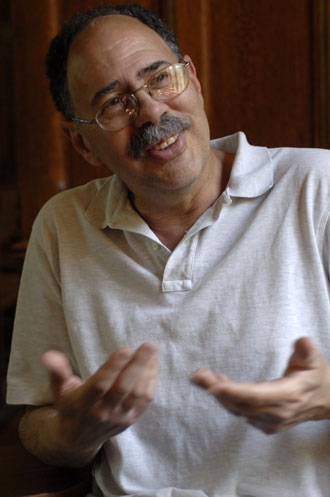 Raising the Stakes
Raising the Stakes
For Fred Baumann, the Harry M. Clor Professor of Political Science, political philosophy is inherently exciting. The trick is to get students to engage with Plato in a way that's not, well, platonic.
Embrace the art of under-preparation
Fred Baumann led his first class as a graduate student at Harvard University. Determined not to run short on material, he amassed enough information to occupy the students for the entire school year. "I hit people with an awful lot because I was afraid I wouldn't have enough," Baumann admits. "I discovered later that that's one of the great vices--over-preparation." Students aren't impressed by the wealth of knowledge and ultimately become lost in a sea of lessons they don't understand. "You have to start where the students are and not where you left off in graduate school," says Baumann, who now declares himself to be a "world-class under-preparer."
Infect your students (with your passion for the subject)
The world's great philosophers take center stage in Baumann's courses. And to him, these thinkers--among them Plato, Machiavelli, Hobbes, Locke, and Nietzsche--are more than simply brilliant minds brimming with abstractions. Their insights are compelling, provocative, and forever relevant: they apply to students' lives and to contemporary events, in a way that Baumann finds exciting, even urgent. The trick, Baumann says, is to share that excitement with the students, and he does that by letting his own passion for the masters loose in the classroom. Passion is infectious, he feels. Aristotle can be dry stuff if taught dryly. But a teacher who is animated will animate the students as well. "Sixty percent of teaching is emphasizing the fun of the subject," Baumann says. "Students are suggestible, so if you're having a good time, they're having a good time, too--not at the expense of the subject, but by means of it and through it."
Provoke them (or coax them) out of silence
Many of Baumann's courses rely on productive classroom discussion, an approach that succeeds only if the students are willing to talk. Generally, Baumann can rely on the compelling nature of the subject matter to stimulate lively exchanges. For example, the year-long introductory seminar "Quest for Justice" takes up philosophical issues that lend themselves to debates on topics like war, individual rights, and critiques of democracy. But if Baumann's invitation to discuss a particular issue is met with silence, he simply raises the stakes. "So, you're telling me you think slavery was right?" he might say, knowing that such an inflammatory comment will prompt someone to speak. "Every eighteen-year-old has an opinion about things, and some of them are eager to explain them," says Baumann. "You just have to frame the question in such a way that they have to answer." He takes a different tack, however, with students who seem shy or afraid to speak in public. Rather than call on them in class, possibly mortifying them into a more permanent classroom silence, he asks students to submit questions about the course topics via e-mail before class. "If a quiet student asks me a question that way, I can raise their question in class and bring them into the conversation that way."
Teach, don't think
All teachers will at some point feel their students losing interest. The class will begin to slip away and instructors are left to puzzle what went wrong. Nine times out of ten, Baumann suggests, the problem started when the teacher started thinking: about staying true to the syllabus, or how to get through all the test material before midterms. "Concentrate on the subject matter and whatever happens, happens," Baumann says. "Everything should be ad rem, that is, to the matter at hand, for the purpose of getting ever deeper into the subject."
Do you have feedback on this page?
